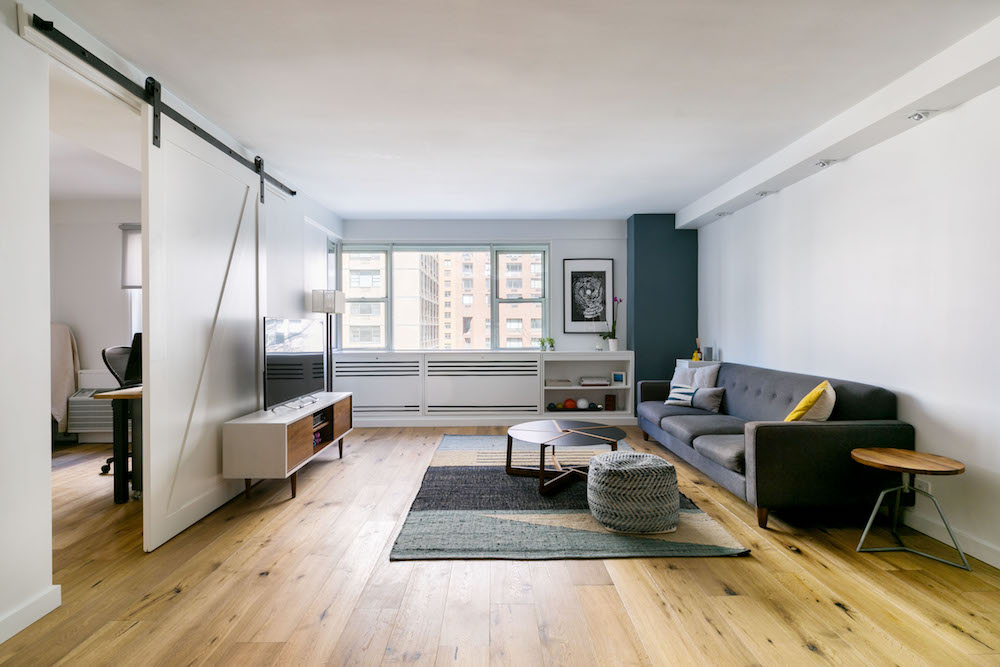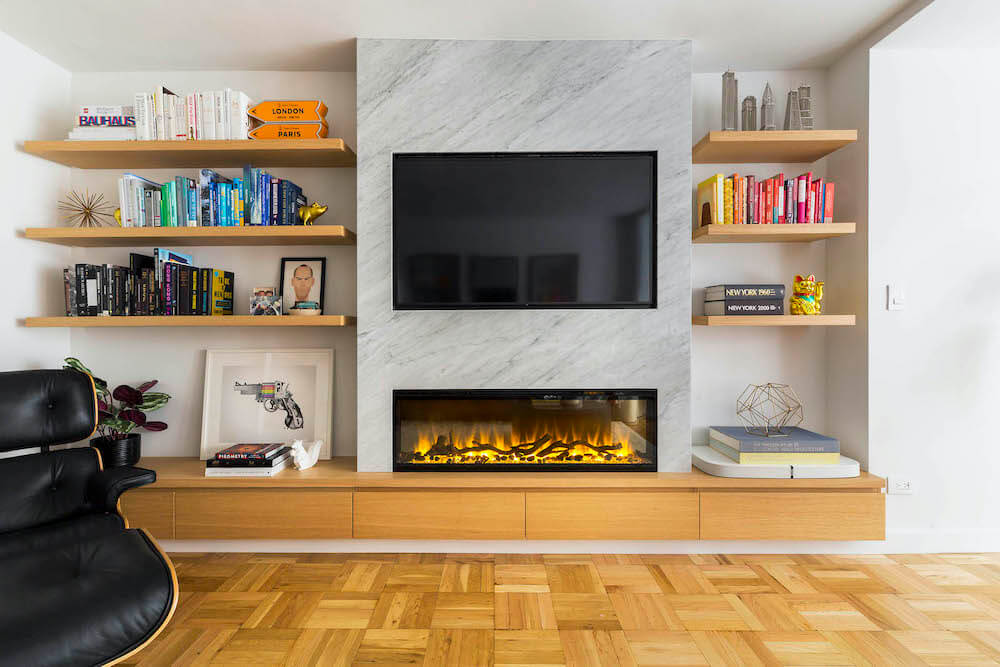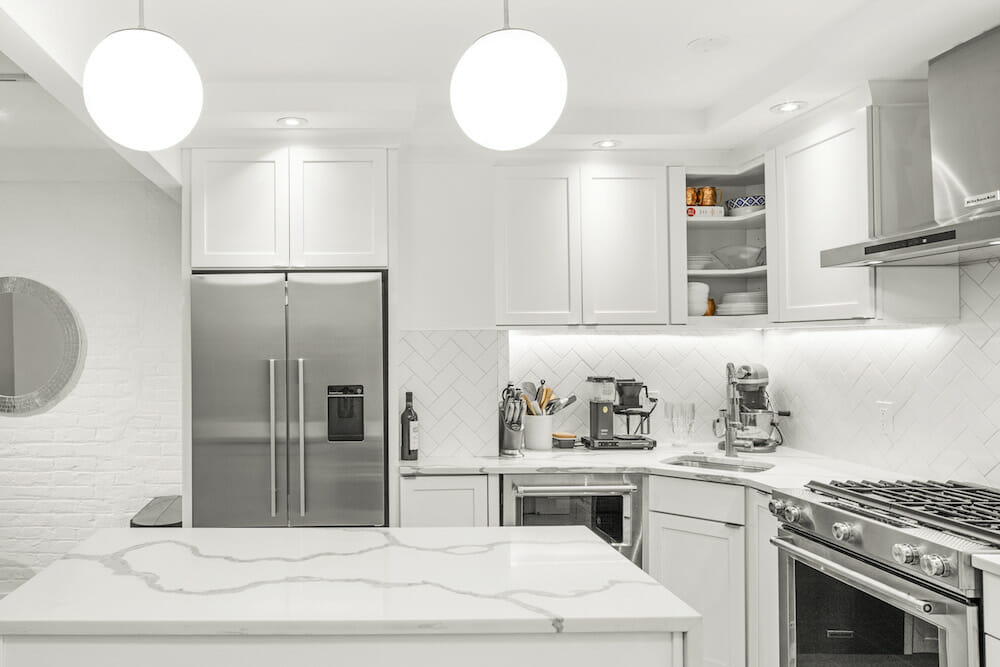Should I Refinish My Hardwood Floors?
Considering refinishing your wood floors? Ask yourself these questions—and know the alternatives
Hardwood floors are like cats: they have many lives. Depending on the type—engineered or solid—they can be re-sanded and stained from one to ten times. Refinishing wood floors can last up to a decade if the floors are treated gently. With that in mind, it’s sensible to think through whether you should refinish your hardwood floors. Sweeten takes a look at how refinishing takes both money and time, but it can be worthwhile in the end.
Sweeten matches home renovation projects with vetted general contractors, offering guidance, tools, and support—for free.
Benefits to Refinishing Your Wood Floors
There are many benefits to refinishing your hardwood floors. It may be obvious that flooring is a major component to any space. It’s also one that is easily overlooked because floors serve as the backdrop to furnishings and decor. Especially if your home is older, addressing any nicks and stains in your wood floors can give it an updated and finished feel.
Second, newly refinished hardwood floors are beautiful. While that could be considered an opinion, it’s one that many people hold: according to Money.com, hardwood floors can add 3-5% to your home’s value.
Their longevity is a helpful perspective to keep in mind during the days or weeks it takes to have the work done. As the saying goes, it’s short-term pain for long term gain!
Evaluate the Condition of Your Floors
If you’ve lived in your home for a long time or weren’t able to refinish the floors before moving in, you’ll want to be sure that refinishing is the right route. Moving all of your earthly possessions out and then back into the rooms that need attention is no walk in the park! Evaluate the condition of your wood floors carefully.
Some items to consider are:
Can the floors withstand another sanding?
Solid hardwoods can be re-sanded more times than engineered hardwoods due to the thickness of the hardwood surface. Make sure there is enough wood remaining before proceeding (You can discuss this with your contractor).
Are the floors damaged?
If there are dark stains, missing chunks or gaps, or mismatched wood (perhaps from a previous repair), it may be time to refinish. Spot-matching wood stain is difficult; a full sanding and refinishing is the only way to ensure color consistency.
Do the floorboards smell?
Along with stains can come odors. Depending on the source and strength of the odor, a simple coat of polyurethane could lock the smell away. Pet urine stains are difficult to remove; in this case, a complete refinish may be your best bet at resolving it.
Are there soft spots on the floor?
A soft spot can indicate a thin or rotted subfloor. Old water damage, or pet urine that was allowed to sit too long, could be to blame. When patching damaged wood, there is a chance the subfloor may need to be replaced in that area as well.
Renovate to live, Sweeten to thrive!
Sweeten brings homeowners an exceptional renovation experience by personally matching trusted general contractors to your project, while offering expert guidance and support—at no cost to you.
Floors that need patching or repairing are good candidates for refinishing. It’s the smoothness, color consistency, and the final shine that really make finished floors pop. Consider these points when you reflect on how refinishing may improve the overall look and feel of your home.
Alternatives to Refinishing Hardwood Floors
There are times when refinishing is not in the cards for homeowners. It might not fit in the budget, or they may not have the time or resources to remove furniture from every room with wood floors. There are some alternatives where you can enjoy your existing wood floors and push back the timeline on needing to do a complete refinishing.
Painting hardwood floors
The least expensive, and likely most controversial, alternative to refinishing your hardwood floors is to paint them.
Pros
- Paint allows homeowners to get creative with patterns.
- Painting may be more in-line with a homeowner’s style; not everyone loves the look of refinished hardwoods.
- Painting is less expensive than refinishing.
- This option can extend the life of wood floors that are too thin to be re-sanded.
Cons
- Paint may not last as long; be sure to choose a durable material.
- This is a more controversial alternative, as some people feel that painting hardwoods ruins them. This is a personal preference.
- Chipped paint may be easily noticed.
- Sanding off paint is more difficult than sanding a floor with standard refinishing.
Repairing hardwood floors
When time and money are tight, repairing select areas of damaged wood could be a good short-term option.
Pros
- Repairing localizes the work, which could eliminate the need to move out all of your furniture.
- Focusing on repairing now means that your floors will be ready when it comes time for a full refinish.
- Replacing damaged wood can eliminate trip or splinter hazards, odors, and soft spots. This alone could make a room feel more comfortable.
Cons
- The color of the wood will not be consistent and the patching may be obvious.
- Some contractors may prefer to do all the work at once, making it more difficult to find a contractor for this smaller job. However, it can be added onto a renovation you may already be having elsewhere in the home.
Sealing hardwood floors
This is a less expensive option that will help to protect your floors from further wear and tear. It skips the sanding and staining steps; simply add a coat of polyurethane.
Pros
- Skipping the sanding step means no dust!
- Sealing will protect your floors for a few more years. If you are renting out the home, or want to wait to refinish until selling a home, this is a good option.
- Sealing can help to reduce odor from pet stains.
Cons
- You will still need to remove all of your furniture so that floors can be sealed with a coat or two of polyurethane.
- The smell of fresh polyurethane may take some time to dissipate.
- You will need to seal again if you intend to refinish down the road; this essentially adds a cost to the total floor care.
- Stains or gaps will still be visible since they were not sanded out or repaired.
Questions to Ask Your Contractor
Not all floor refinishing contractors are alike. They offer different levels of service, and some even use different equipment. When hiring a contractor for refinishing wood floors, ask the following questions:
- How will my rooms and furniture be protected?
Sanding floors creates a substantial amount of dust. If you have rooms that won’t be emptied while work is being done, you’ll want to ask how those rooms will remain clean. Some contractors offer a dustless service. This means the contractor uses a sander with a vacuum that draws the dust out of the home during the sanding process. While “dustless” is not 100% dust-free, it will significantly cut down the mess you will need to clean up after the job is finished. If they don’t offer dustless sanding, ask if the contractor will seal off rooms that won’t need sanding with plastic or canvas drop cloths.
- Be aware of the timeline.
If you are repairing or adding additional wood flooring, be aware that wood boards need to acclimate to your home’s temperature and humidity before being installed. Also, you will not have access to walk on your floors while the stain and varnish is drying, and you may want to air out the house from their smell. Ask how long each of these items will add to the timeline.
- Cost considerations
Some contractors have an average price per square foot they will quote. If you have areas that need additional attention (squeaks, soft spots, staining), ask how much addressing those issues will add to the total cost.
- Flooring transitions
In instances where new wood will meet with old, discuss with your contractor how the transition between new and old wood will happen. This could include areas that need patching, or where an adjacent room’s flooring is replaced with hardwoods. Ask if they will match the wood type and size, or if they can make the transition look seamless.
Deciding to refinish hardwood floors
There is a lot to consider when it comes to refinishing hardwood floors. Do your research, and get quotes from multiple contractors who specialize in it. Ask questions—and make sure you understand all options at your disposal. In the end, that’s the best way to be confident in knowing whether refinishing your hardwood floors is right for your home.
—
Sweeten handpicks the best general contractors to match each project’s location, budget, scope, and style. Follow the blog, Sweeten Stories, for renovation ideas and inspiration and when you’re ready to renovate, start your renovation with Sweeten.









